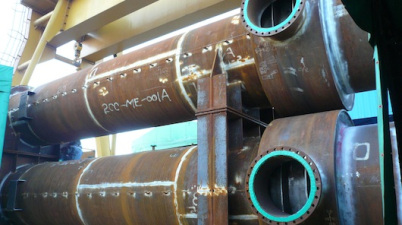News
Monel 400- Excellent anticorrosive material for process vessels
Monel bars are made of two types of Monel alloys such as Monel 400 and Monel K-500. Monel 400 has high strength over various temperatures and has high resistance to various corrosive environments from mildly oxidizing through neutral and in moderately reducing conditions. It has high performance in marine and other nonoxidizing chloride solutions. It is a nickel-copper solid solution alloy which can only be hardened by cold working. It has low strength in annealed condition and is offered in a variety of tempers for increasing the strength of the material. It is widely used in Boiler feedwater heaters, Crude petroleum stills, Chemical processing equipment, Pumps & propeller shafts, Heat exchangers, Process vessels & piping, Valves & pumps, Marine fixtures & fasteners.
The physical constants and thermal properties of Monel 400 were studied. The effect of temperature on modulus of elasticity in tension was studied. It was observed that the Curie temperature lied within the ambient range. It was affected by variations in chemical composition. The values represented the expected range from normal production, therefore, some heats were magnetic at room temperature. Other Monel alloys should have been considered if there was a strong requirement for nonmagnetic characteristics.
The nominal room-temperature tensile properties of Monel 400 were studied. Additional data on hardness of various tempers of sheet and strip was studied. Typical data showing relationships between properties of rods, forgings, sheet and strip was studied. The study of the Short-time high temperature properties of hot-rolled annealed material was done. The mechanical properties of Monel 400 at subzero temperatures are excellent. A slight impairment of ductility or impact resistance increased the strength and hardness. The alloy didn’t turn from ductile to brittle even when cooled to the temperature of liquid hydrogen. This is in contrast to numerous ferrous metals which are brittle at low temperatures despite their increased strength.
Compressive properties determined in triplicate on single typical melts were studied along with the corresponding tensile properties and hardness. The modulus of elasticity in compression was the same as that in tension. Several tests were conducted to determine the room-temperature shear strength of Monel 400 sheet and the average values of all the tests were considered. The shear strength of rivet wire at various temperatures was studied. Shear properties were determined on 1/8-in. diameter wire in double shear. The material showed excellent ductility and tough fracture characteristics over the temperature range down to -320°F in U.S. Navy tear tests with the maximum load increasing considerably with decrease in temperature. There is a possibility of a failure in riveted joints by tearing out a segment of sheet instead of by shearing the rivet. The resistance of sheet metal to this deformation is known as bearing strength. Bearing strength was evaluated using a hard pin or rivet to enlarge or tear a hole in a sample of sheet metal. The data was determined with samples 0.062 x 1.25 x 2.5 in. in size having a 3/16-in. hole located so that its center was 3/8-in. from the edge. A snugly fitted pin was placed in the hole. The ultimate strength is the maximum load for tearing out the hole and the yield strength is the load required for a permanent enlargement of the hole diameter by 2%. Both the ultimate and yield strengths were determined and calculated in bearing. The yield strength of Monel 400 annealed was 58.0 ksi, for Monel 400 Half-Hard was 98.1 ksi and for Monel 400 Full-Hard was 162.0 ksi. The ultimate strength of Monel 400 annealed was 145.0 ksi, for Monel 400 Half-Hard was 166.0 ksi and for Monel 400 Full-Hard was 211.5 ksi.



